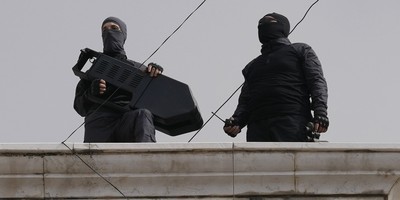It was Trump, not the Justice Department, who decided to issue that revised order, based on the reasonable expectation that it would be easier to defend in court. And contrary to Trump's claim that his "smart, vigilant and tough" policy provides "an extra level of safety," there is little reason to think either version of the travel ban would reduce the average American's already tiny risk of being killed by a terrorist.
Trump's original order, issued on January 27, imposed a 90-day ban on travel to the United States by citizens of seven Muslim-majority countries: Iran, Iraq, Libya, Somalia, Sudan, Syria, and Yemen. It suspended admission of refugees for 120 days, indefinitely for Syrians.
The revised order, issued on March 6 after the first version was blocked by the courts, removed Iraq from the list of targeted countries and eliminated the distinction between Syrians and other refugees. Two other changes were more legally significant.
The revised order clarified that the travel ban does not apply to lawful permanent residents, who according to the Supreme Court have a right to due process when the government tries to exclude them, or current visa holders, whose American hosts might have standing to sue. Trump's lawyers also excised a preference for refugees from religious minorities (typically Christians), which critics cited as evidence of unconstitutional anti-Muslim bias.
Recommended
Trump, who approved those changes, now says they were a mistake. "The Justice Dept. should ask for an expedited hearing of the watered down Travel Ban before the Supreme Court," he tweeted on Monday, "& seek much tougher version!"
That comment misconstrues the roles of the Justice Department, which is defending Trump's order, not rewriting it, and the Supreme Court, which can only review the order as it stands. And if Trump plans to revive the original ban after the second one passes muster, he will only prolong the litigation he claims is endangering national security.
That claim is highly implausible. Trump says he picked the seven (now six) countries covered by the travel ban because they were on a list of nations excluded from the visa waiver program as sponsors of terrorism or havens for terrorists. But people from those countries seem to pose a much smaller terrorist threat than people from countries that were omitted from the order.
Based on his count of domestic plots and attacks by foreign-born terrorists from 1975 through 2015, Cato Institute immigration analyst Alex Nowrasteh reports that 19 perpetrators came from Saudi Arabia, 14 from Pakistan, 11 from Egypt and 11 from Cuba. Their combined death toll was 2,537.
During the same period, Nowrasteh found, six foreign-born terrorists came from Iran, six from Sudan, two from Somalia, and one from Yemen. None came from Libya or Syria. The combined death toll for terrorists from those six countries was zero.
University of North Carolina at Chapel Hill sociologist Charles Kurzman compiled information on Muslims who carried out or were accused of planning domestic attacks last year. Most (12 out of 23) were American-born converts. Just two, both Somalis who were shot and killed during nonfatal knife attacks, came from a country on Trump's list or had parents who did.
Even if the list made sense, it is hard to imagine how the "extreme vetting" Trump promises could identify future terrorists. As an internal Department of Homeland Security report noted last March, "most foreign-born, U.S.-based violent extremists likely radicalized several years after their entry to the United States, limiting the ability of screening and vetting officials to prevent their entry."
The travel ban is security theater, designed to look tough on terrorism without doing much about it. Trump confuses political incorrectness with seriousness.

























Join the conversation as a VIP Member